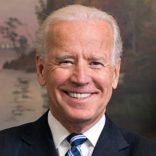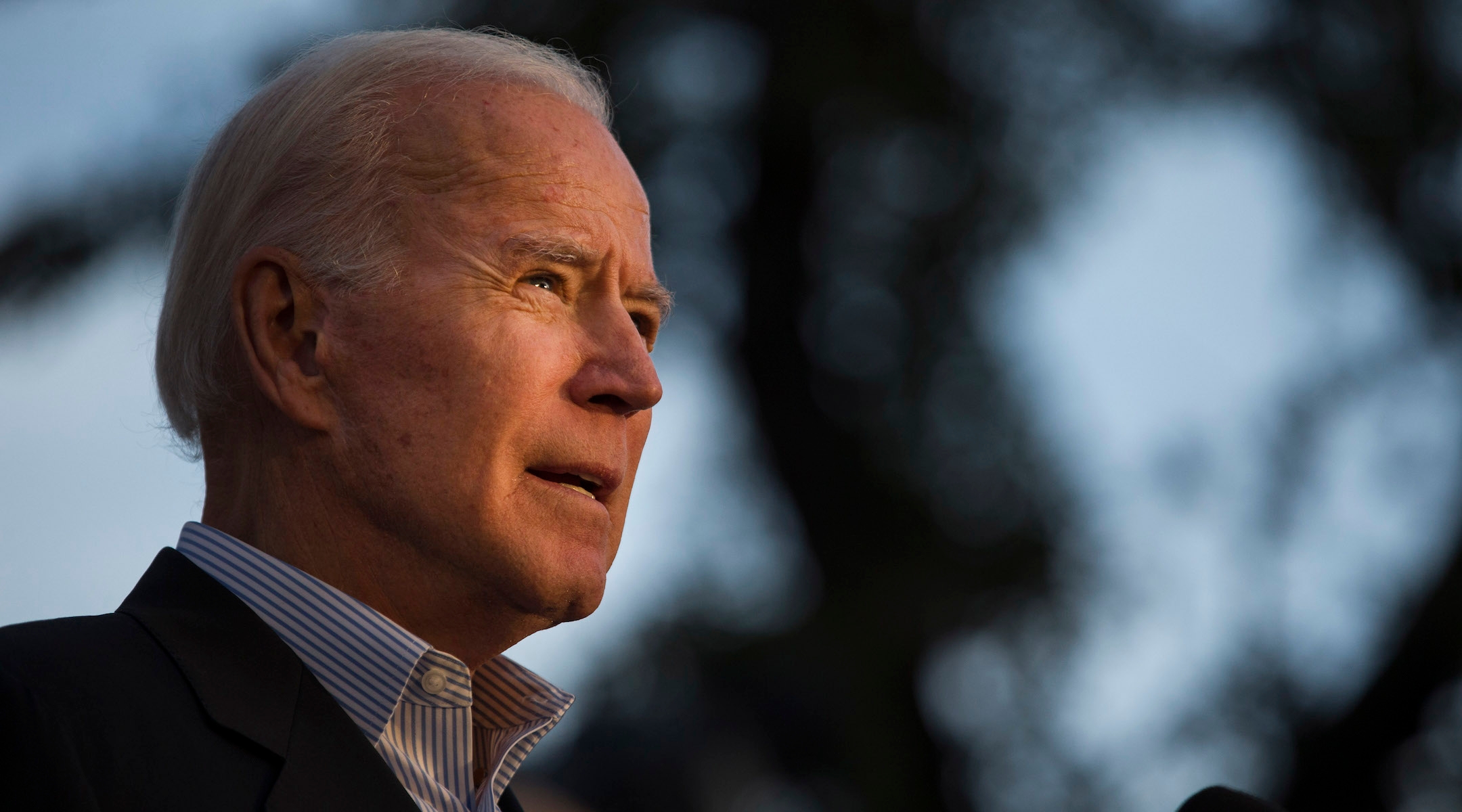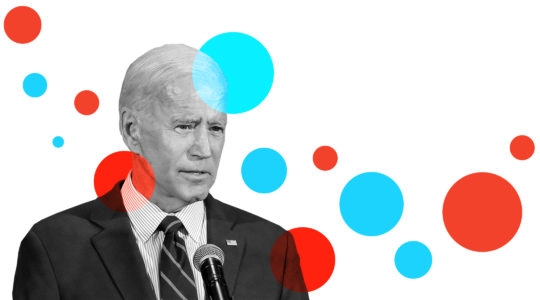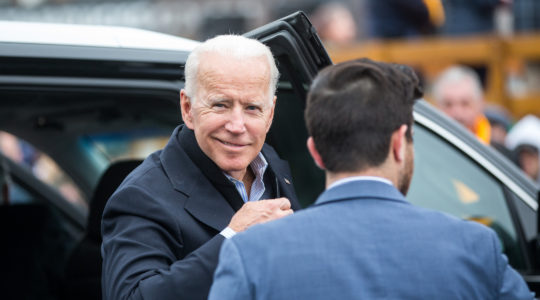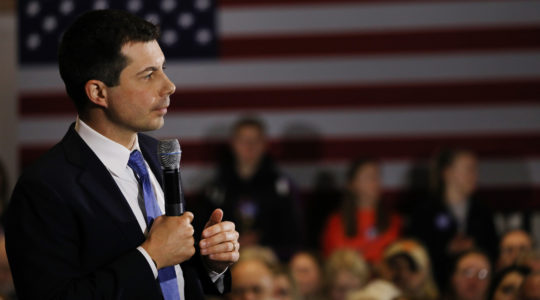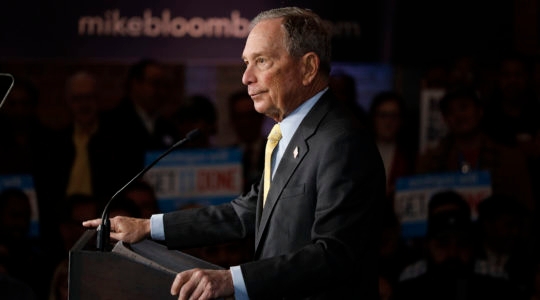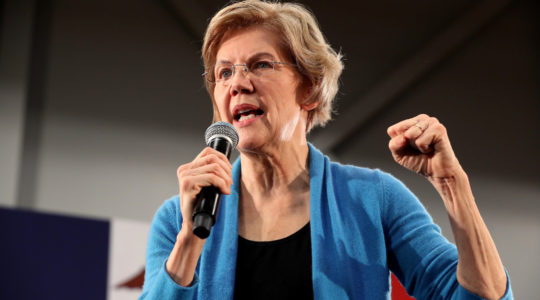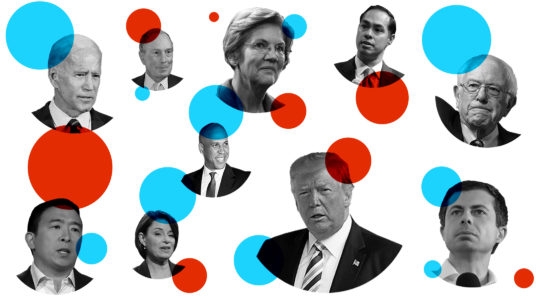(JTA) — This is the first op-ed in a series of pieces about anti-Semitism and Jewish issues written by 2020 presidential candidates. This one is by Joe Biden, 77, the former Vice President of the United States.
The Jewish Telegraphic Agency has sent five questions on the topic to all of the registered candidates from both parties. You can read Mayor Pete Buttigieg’s responses here, Mayor Mike Bloomberg’s responses here, and Senator Elizabeth Warren’s responses here.
1. Anti-Semitic hate crimes are currently on the rise across the United States. In 2018, there were two deadly shootings at synagogues in Pittsburgh and Poway, violent attacks now regularly plague the Jews of New York City and Jews continue to be the target of most religion-based hate crimes across the country. What is your plan to address the rise in anti-Semitism across the U.S.?
We have a serious problem with rising tides of white supremacy and anti-Semitism — both in America, on the political right and left, and around the world. It’s not a new phenomenon, but it is the responsibility of leaders everywhere to work aggressively to combat this poison. Instead, we have a president who, in clear language and in code, encourages and emboldens it.
After Charlottesville, Donald Trump gave renewed license and safe harbor for hate to white supremacists, Neo-Nazis, and the KKK. There’s a short line from those people marching with tiki torches in Charlottesville chanting “Jews will not replace us” to the shooter at the Tree of Life synagogue in Pittsburgh saying Jews “were committing genocide to his people.”
We need a comprehensive approach to battling anti-Semitism that takes seriously both the violence that accompanies it and the hateful and dangerous lies that undergird it. Sadly, anti-Semitism takes many different forms and cuts across ideology, political party, group and nation. So we must remain vigilant and speak out every time we see the persistent evil of anti-Semitism rear its ugly head. It’s incumbent on all of us to stand against those who traffic in pernicious stereotypes, or who seek to scare and divide us for political gain. Silence is complicity, so we must speak out — every time. We must call hate by its proper name, and condemn it.
We must also address the extremist, white supremacist violence that has sparked so much bloodshed, especially with Trump fanning the flames of hatred and hollowing out resources we put in place during the Obama-Biden administration to address domestic extremism. I’ll restore that funding and work to pass a federal domestic terrorism law. We can craft legislation that respects free speech and civil liberties, while making the same commitment as a nation to root out domestic terrorism as we have to stopping international terrorism. We must appoint leadership at the U.S. Department of Justice who will prioritize the prosecution of hate crimes — making clear that there is no place for such vitriol in this country.
And we must break the nexus between extremism and gun violence by enacting sensible gun control laws. As president, I’ll make sure assault weapons and high capacity magazines are banned again, and we’ll put in place a buy-back program to get as many of these weapons of war as possible off our streets.
Finally, we know that this hate didn’t begin with Donald Trump and it won’t end when he leaves office. American history is not a fairytale. The battle for the soul of this nation has been a constant push-and-pull between the American ideal that we are all created equal — and the harsh reality that racism and anti-Semitism have long torn us apart. So we must renew our commitment to our highest ideals and do what this president cannot — stand together against hate; stand up for what, at our best, this nation believes.
2. A number of Democratic lawmakers have recently critiqued Israel in ways that some have characterized as anti-Semitic. What is the line between legitimate criticism of Israel and anti-Semitism to you?
No nation, including Israel, is immune from legitimate criticism. For example, I have for decades opposed the expansion of settlement activity as counterproductive to peace and damaging to U.S. support for Israel, and I have shared those criticisms directly with Israeli leadership, from Menachem Begin to Bibi Netanyahu. But Israel should never be unfairly singled out or targeted. It’s dangerous. And any action designed to marginalize one ethnic or religious group imperils us all — that’s something the Jewish people know all too well.
That’s why it’s critical to stand against biased resolutions and attempts to delegitimize Israel at the United Nations, and why it’s important to ensure Israel, like other nations, is represented on important committees there.
And it’s why I’ve been clear: the calls here in the United States to boycott, divest from, and sanction Israel are wrong. Period. The BDS movement singles out Israel — home to millions of Jews — in a way that is inconsistent with the treatment of other nations, and it too often veers into anti-Semitism, while letting Palestinians off the hook for their choices.
3. Countless politicians have tried to broker peace between Israel and the Palestinians, and yet, a two-state outcome now seems more dream than possibility. What are your concrete plans to address the conflict between Israel and the Palestinians?
I believe a two-state solution is the only path to long-term security for Israel, while sustaining its identity as a Jewish and democratic state. It is also the only way to ensure Palestinian dignity and their legitimate interest in national self-determination. And it is a necessary condition to take full advantage of the opening that exists for greater cooperation between Israel and its Arab neighbors.
At present, neither the Israeli nor Palestinian leadership seems willing to take the political risks necessary to make progress through direct negotiations. This challenge has been made even more difficult by President Trump’s unilateralism, his moves to cut off assistance to the Palestinians and his equivocation on the importance of a two-state solution.
I will restore credible engagement with both sides to the conflict. America must sustain its ironclad commitment to Israel’s security – including the unprecedented support provided by the Obama-Biden administration. It is also essential to resume assistance to the Palestinian Authority that supports Israeli-Palestinian security cooperation, people-to-people programs, economic development, and humanitarian aid and health care for the Palestinian people.
My administration will urge both sides to take steps to keep the prospect of a two-state outcome alive. Palestinian leaders should end any incitement and glorification of violence, and they must level with their people about the legitimacy and permanence of Israel as a Jewish state in the historic homeland of the Jewish people. Israeli leaders should stop the expansion of West Bank settlements and talk of annexation that would make two states impossible to achieve. They must recognize the legitimacy of Palestinians’ aspirations for statehood. Both sides should work to provide more relief to the people of Gaza while working to weaken, and ultimately replace, Hamas. And Arab states should take more steps toward normalization with Israel and increase their financial and diplomatic support for building Palestinian institutions.
4. Is there any part of American Jewish culture, or Jewish figure from history, that has been particularly meaningful to you in your life?
I’ve had the honor of meeting every Israeli Prime Minister since Golda Meir and formed close relationships with many of them. In particular, I treasured my deep, personal friendship with Shimon Peres and the wisdom and kindness with which he imbued his leadership. He had an unyielding commitment to the inherent dignity and worth of every single human being, and in my opinion, he embodied the conscience and the soul of Israel. Shimon was always about hope, always about the future.
I met him on my first visit to Israel in 1973 — during my first year in the Senate. That’s also the trip where I met with Meir and her then-aide Yitzhak Rabin for close to an hour. She went through what happened during the Six-Day War, the price that was paid, and painted a bleak picture that, quite frankly, scared me. I had just come from Egypt, and I had seen what was happening there. But when we walked out for the press to take our photo, she said to me: “Senator, don’t worry. We have a secret weapon. You see, we have nowhere else to go.” Just about a month later, the Yom Kippur War touched off.
That experience was foundational for me. It made me understand, in my gut, the threat that the Israeli people live under every day — but also their resilience. Peres and Meir showed me the spirit of a people who, against all odds, transformed the desert, founded a robust democracy and built a thriving economy based on innovation. It’s why I am and have always been such a strong supporter of Israel.
5. Have you participated in a Passover seder or other Jewish holiday ritual? If so, what were the circumstances, and what was the experience like for you?
I’ve had the honor of sharing many meaningful experiences with Jewish friends and family — celebrating weddings, sitting shiva. During our first year in office, in 2009, President Obama became the first president to host a seder at the White House — a tradition he maintained each year of his presidency. In 2013, Jill and I were proud to have the first Vice Presidential Sukkah at the Naval Observatory, and we welcomed Jewish children from the community to come decorate it. It was incredibly meaningful to be able to host our friends from the community during Sukkot with traditional hospitality. And in 2014, I presided over the lighting of the National Menorah to mark the start of Hanukkah with a message that is critical for us all to remember today: “Jewish heritage is American heritage.”
JTA has documented Jewish history in real-time for over a century. Keep our journalism strong by joining us in supporting independent, award-winning reporting.
